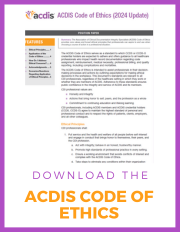Application of the Code of Ethics
The ACDIS Code of Ethics outlines aspirational principles and guidelines. It is meant to reflect the commitment of all individuals, agencies, organizations, and bodies allied with the association to uphold the profession’s values.
The Code of Ethics does not provide a set of rules prescribing how to act in all situations. Any application of the code must consider the context of the situation and the possibility of conflicts among the code’s values, principles, and guidelines. Ethical responsibilities flow from all human relationships, from the personal and familial to the social and professional. Further, the ACDIS Code of Ethics does not specify which values, principles, and guidelines are the most important and ought to outweigh others in instances of conflict.
How Do I Address Ethical Concerns?
To address ethical concerns, reference industry information and/or resources from reliable organizations related to your practice and the associated concern. This may include ACDIS, the American Health Information Management Association (AHIMA), the Agency for Healthcare Research and Quality (AHRQ), the American Nurses Association (ANA), the American Medical Association (AMA), etc. Also review organizational policies and practices, and follow your organization’s established processes for escalating compliance concerns.
Generally, you should first approach your departmental leadership with your concern and ask for clarification regarding potential actions. If you feel uncomfortable calling attention to the issue at this level, you can submit a summary of your concern to the corporate compliance officer. Often this can be done anonymously.

